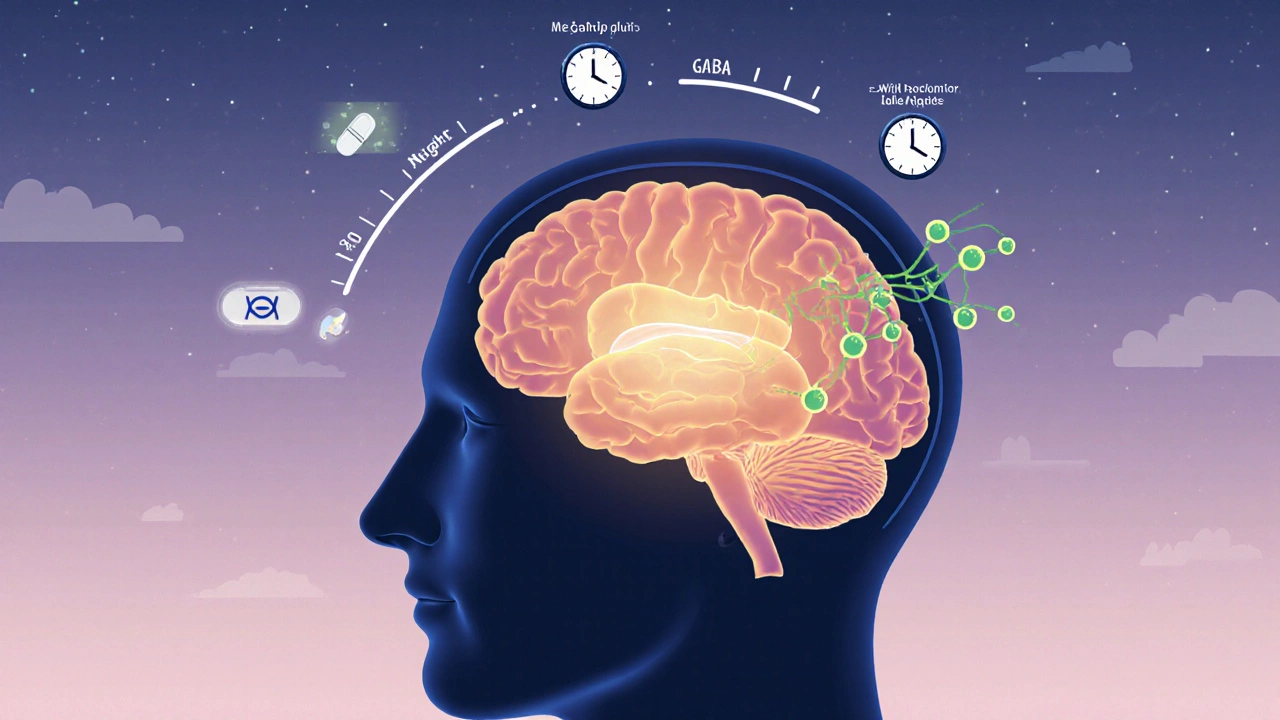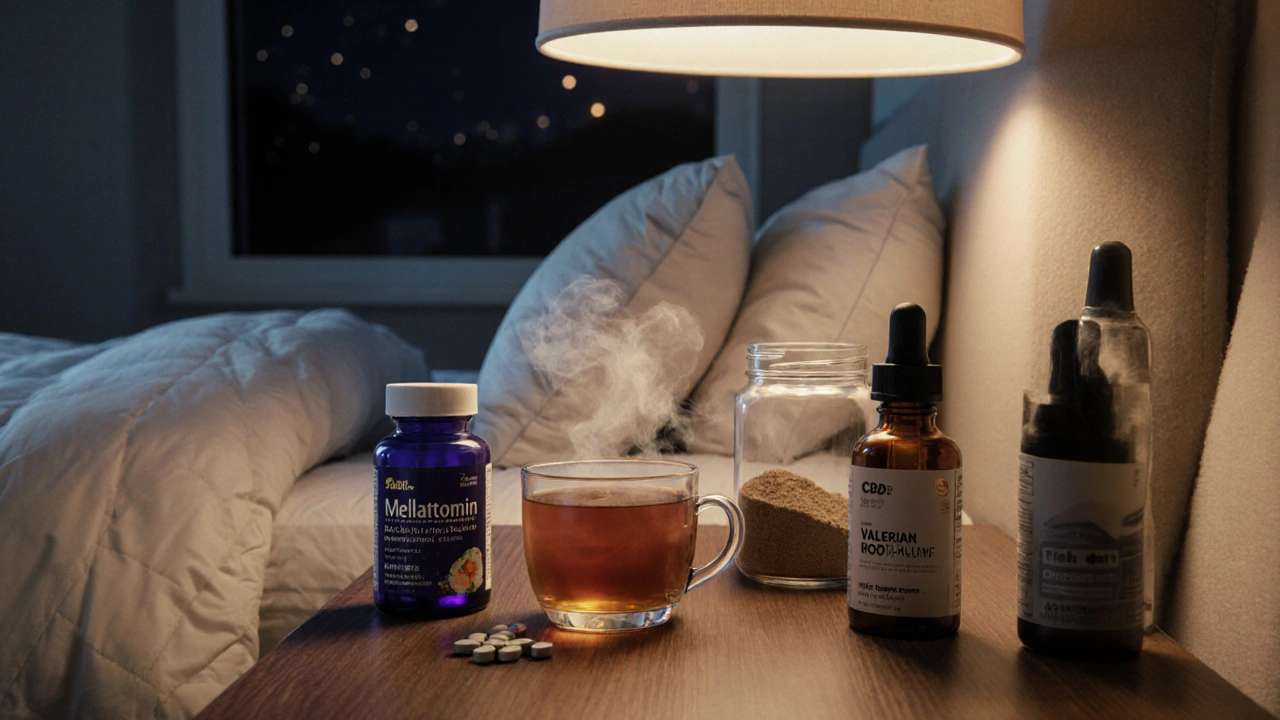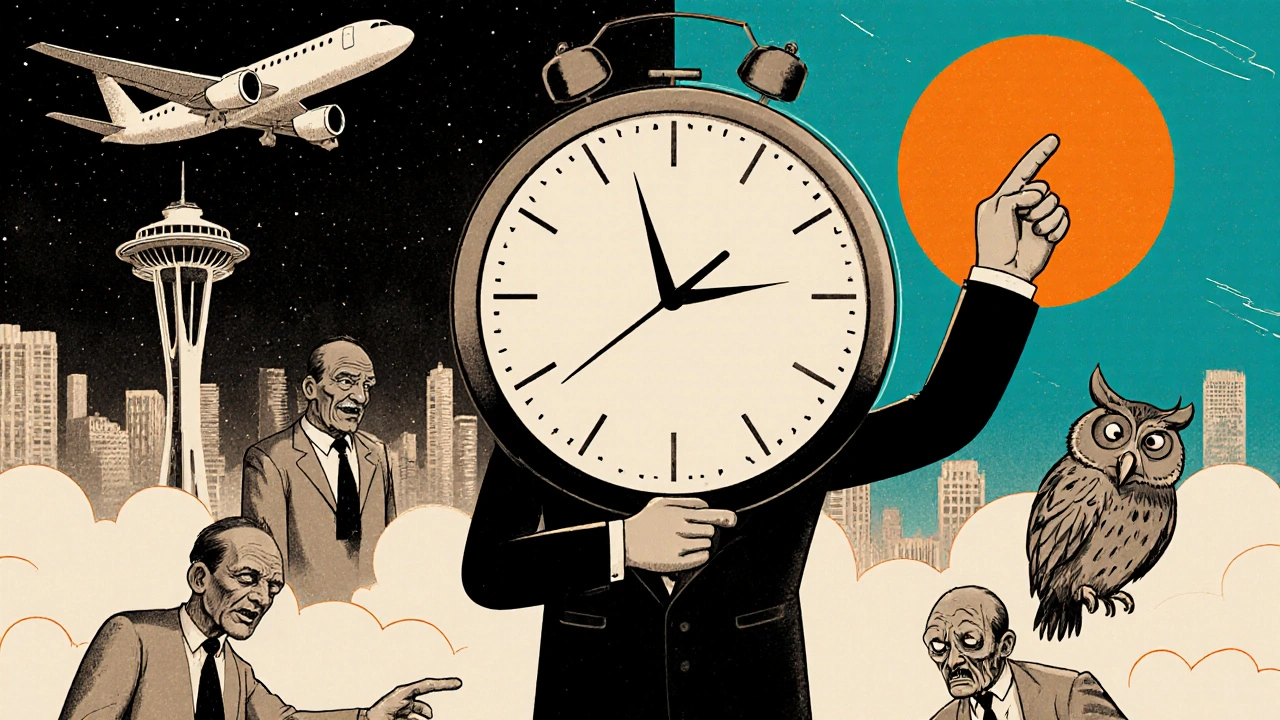Key Takeaways
- Melatonin is a hormone, not a herbal extract, and works quickly for shift‑work or jet‑lag.
- Valerian root and chamomile are gentle, plant‑based options best for mild insomnia.
- Magnesium supports muscle relaxation and can improve sleep quality over weeks.
- L‑tryptophan, 5‑HTP, and CBD each target different neurotransmitters, offering tailored benefits.
- Choosing the right sleep aid depends on timing, side‑effect tolerance, and personal health goals.
Struggling to fall asleep? You’re not alone. The market is flooded with sleep‑enhancing products, from over‑the‑counter melatonin pills to herbal teas and mineral supplements. Deciding which one actually helps can feel overwhelming. This guide breaks down melatonin and its most popular alternatives, compares their key attributes, and gives you a clear path to pick the right option for your nightly routine.
What Is Melatonin?
Melatonin is a hormone produced by the pineal gland that regulates the body’s circadian rhythm. When darkness hits, melatonin levels rise, signaling to the brain that it’s time to wind down. Supplemental melatonin mimics this natural spike, helping the body adjust to new sleep schedules.
Typical doses range from 0.5mg to 5mg taken 30‑60 minutes before bed. Effects usually kick in within 20‑40 minutes, making it a go‑to choice for shift workers, jet‑lag sufferers, and anyone who needs a quick nudge toward sleep.
Popular Alternatives to Melatonin
Below are the most widely used non‑prescription options that people turn to when melatonin isn’t enough or they prefer a more “natural” route.
Valerian Root
Valerian root is a plant extract traditionally used for its sedative properties. It works by increasing GABA activity, a neurotransmitter that calms brain activity. Doses typically 300‑600mg taken 30‑60 minutes before bedtime.
Chamomile
Chamomile is a flower used in teas and extracts for its mild calming effect. It contains apigenin, which binds to benzodiazepine receptors, promoting relaxation. A standard cup of tea or 200‑400mg extract is common.
Magnesium
Magnesium is a mineral essential for muscle function and nervous system regulation. Supplemental magnesium, especially the glycinate or citrate forms, helps reduce restless leg sensations and can improve overall sleep quality when taken 200‑400mg about an hour before sleep.
L‑Tryptophan
L‑Tryptophan is an essential amino acid that the body converts into serotonin and later melatonin. A dose of 500‑1,000mg taken 30 minutes before bed can boost the natural melatonin pathway.
5‑HTP (5‑Hydroxytryptophan)
5‑HTP is a direct precursor to serotonin, often used to improve mood and sleep. Typical dosing is 100‑300mg 30‑45 minutes before sleep.
CBD (Cannabidiol)
CBD is a non‑psychoactive cannabinoid derived from hemp that interacts with the endocannabinoid system. It may reduce anxiety and pain, indirectly supporting better sleep. Common products range from 10‑25mg of CBD per serving, taken an hour before bedtime.

Side‑by‑Side Comparison
| Supplement | Type | Typical Dose | Onset Time | Sleep Quality Rating* (1‑5) | Common Side Effects |
|---|---|---|---|---|---|
| Melatonin | Hormone | 0.5‑5mg | 20‑40min | 4 | Drowsiness next day, vivid dreams |
| Valerian root | Herb | 300‑600mg | 30‑60min | 3.5 | Headache, stomach upset |
| Chamomile | Herb (tea/extract) | 200‑400mg or 1 cup tea | 15‑30min | 3 | Allergic reaction (rare) |
| Magnesium | Mineral | 200‑400mg | 45‑60min | 4 | Loose stools, nausea |
| L‑Tryptophan | Amino acid | 500‑1,000mg | 30‑45min | 3.5 | Drowsiness, gastrointestinal upset |
| 5‑HTP | Precursor | 100‑300mg | 30‑45min | 4 | Nausea, heartburn |
| CBD | Cannabinoid | 10‑25mg | 40‑60min | 3.5 | Dry mouth, fatigue |
*Based on aggregated user reviews and small‑scale clinical trials up to 2024.
Which Option Is Best for Different Situations?
- Quick jet‑lag recovery: Melatonin’s fast onset makes it the top pick.
- Long‑term sleep quality improvement: Magnesium or a combination of L‑tryptophan and 5‑HTP works gradually and supports overall relaxation.
- Gentle, drug‑free calming: Chamomile tea before bed is ideal for light insomnia or bedtime anxiety.
- When anxiety keeps you awake: CBD or valerian root can address underlying nervousness.
- Need a non‑hormonal route: Magnesium or herbal extracts avoid messing with the hormone balance.

Pros & Cons Checklist
Use this quick list to see the trade‑offs at a glance.
- Melatonin
- Pros: Fast, effective for circadian shifts, low cost.
- Cons: May cause next‑day grogginess, not ideal for chronic insomnia.
- Valerian root
- Pros: Non‑hormonal, calming, widely available.
- Cons: Strong taste, occasional headaches.
- Chamomile
- Pros: Easy to drink, pleasant flavor, minimal side effects.
- Cons: Less potent, may need several cups.
- Magnesium
- Pros: Supports muscle relaxation, benefits overall health.
- Cons: Can cause loose stools, slower onset.
- L‑Tryptophan
- Pros: Boosts natural melatonin production.
- Cons: High doses may cause nausea.
- 5‑HTP
- Pros: Improves mood and sleep simultaneously.
- Cons: Interacts with certain antidepressants.
- CBD
- Pros: Reduces anxiety and pain, no psychoactive high.
- Cons: Quality varies, may be pricey.
How to Choose the Right Sleep Aid for You
- Identify the root cause. Is it a shifted schedule, chronic difficulty falling asleep, or nighttime anxiety?
- Consider timing. Need something that works in under 30 minutes? Melatonin or chamomile are quick.
- Check for interactions. If you’re on SSRIs, avoid 5‑HTP without doctor approval.
- Start low, go slow. Begin with the smallest recommended dose and monitor how you feel.
- Track results. Keep a sleep diary for two weeks to see which supplement improves latency, depth, and morning alertness.
Most people find that a combination works best-for example, magnesium for muscle relaxation paired with a low‑dose melatonin on travel nights.
Frequently Asked Questions
Is melatonin safe for long‑term use?
Short‑term melatonin (a few weeks to months) is generally regarded as safe for most adults. Long‑term data are limited, so if you need nightly assistance for years, discuss alternatives like magnesium or lifestyle changes with a healthcare professional.
Can I combine melatonin with valerian root?
Yes, many people stack a low dose of melatonin (0.5‑1mg) with valerian (300mg) for synergistic sleep onset benefits. Start with the lowest doses and monitor for excessive drowsiness.
Does magnesium help with insomnia?
Magnesium supports the GABA system and can reduce restless leg syndrome, both of which improve sleep continuity. It works best when taken consistently for at least two weeks.
Is CBD legal for sleep support?
In the U.S., hemp‑derived CBD containing less than 0.3% THC is federally legal and sold in many health stores. Check local regulations, especially if you travel abroad.
Should I avoid melatonin if I’m pregnant?
Pregnant or nursing individuals should consult their OB‑GYN before using any sleep supplement, including melatonin, due to limited safety data.








Ramanathan Valliyappa
Melatonin works fast, but watch the morning grogginess.
lucy kindseth
For folks who just need to reset their clock, a low‑dose melatonin (0.5‑1 mg) taken half an hour before bed is usually enough. It mimics the natural spike and won’t leave you feeling hungover the next morning. If you’re prone to vivid dreams, you might want to taper off after a week. Pair it with a calming ritual-like a warm shower or a short meditation-to boost the effect. Consistency is key; keep the timing the same even on weekends.
Nymia Jones
It is imperative to acknowledge that numerous corporations clandestinely manipulate the purported “natural” label to market melatonin analogues that are, in fact, synthetically engineered. Such subterfuge undermines consumer autonomy and may precipitate unforeseen neurochemical repercussions. One must scrutinize the provenance of any sleep aid, insisting upon third‑party verification of purity. Failure to do so perpetuates a cycle of deception orchestrated by vested interests.
Karen McCormack
Sleep, that elusive veil between consciousness and oblivion, has been the subject of countless mythologies and scientific inquiries alike. When we pop a melatonin pill, we are, in essence, borrowing from the pineal gland’s own nocturnal chorus, coaxing the brain to heed the night’s call. Yet the allure of plant‑based sedatives such as valerian and chamomile lies not merely in their pharmacology but in their symbolic resonance with the earth’s quietude. Magnesium, that unsung mineral, slips silently into our muscles, dissolving tension as a river smooths stones. L‑tryptophan, a humble amino acid, embarks on a transformative pilgrimage toward serotonin, then melatonin, weaving a tapestry of neurotransmitter alchemy. 5‑HTP accelerates this journey, offering a shortcut that some find beneficial for mood and sleep alike. CBD, emerging from the hemp canopy, whispers a promise of anxiety relief without the intoxicating haze of THC. The decision, therefore, should be guided by one’s chronobiological needs, health status, and personal philosophy. For the jet‑lagged traveler, melatonin’s rapid onset functions as a temporal compass, steering the internal clock back on course. Those wrestling with chronic muscle tension may discover that magnesium’s slow, steady influence yields the most restorative slumber. Gentle souls seeking ritualistic comfort might prefer a warm cup of chamomile, its floral aroma a lullaby for the senses. Conversely, the restless mind plagued by anxiety could benefit from the anxiolytic properties of valerian or CBD, each tempering the storm of thoughts. In practice, many find a synergistic blend-magnesium at dinner, a modest melatonin dose on travel nights, and a chamomile tea before lights out-produces the most harmonious results. Ultimately, the quest for sleep is a personal odyssey, an intimate negotiation between body, mind, and the night’s quiet promise. By listening to the subtle cues of our own physiology, we can craft a regimen that honors both science and the ancient wisdom of rest.
Earl Hutchins
Magnesium glycinate is my go‑to for restless legs it’s gentle on the stomach and you can take it an hour before bed it supports muscle relaxation and improves overall sleep quality over a few weeks.
Tony Bayard
Wow, reading that felt like traversing a midnight library where every shelf holds a different dream! I totally agree that mixing magnesium with a low melatonin dose on travel nights can be a game‑changer. For me, adding a dash of chamomile tea turned the whole bedtime routine into a soothing ceremony. The way you outlined each supplement’s personality makes it so easy to pick what fits my own nocturnal narrative. Thanks for the lyrical guide-it’s like a lullaby for the brain.
Jay Crowley
Valerian can cause mild headaches in some users.
sharon rider
Traditional herbal teas have been used for centuries to aid sleep. Their gentle effects complement modern supplements without overwhelming the system.
swapnil gedam
I’ve tried the low‑dose melatonin routine you mentioned and found it works best when paired with consistent bedtime habits. Adding a dim light environment and turning off screens 30 minutes prior amplified the effect. If you’re sensitive to dreams, a 0.5 mg dose is usually sufficient. Consistency truly makes the difference.
Michael Vincenzi
Great rundown, I’ll try the magnesium combo first.
Courage Nguluvhe
From a pharmacokinetic perspective, melatonin’s rapid absorption via the hepatic portal vein explains its swift onset, but the resultant half‑life can induce residual somnolence if dosing isn’t calibrated to circadian amplitude.
Oliver Bishop
Our troops need solid sleep, and melatonin is a reliable tactical aid.
Alissa DeRouchie
Sure, but the pharma lobby’s hand is everywhere no one can trust the labels dont you think?
Muthukumaran Ramalingam
Honestly, I just threw a bunch of supplements on the table and hoped for the best. I started with a cheap melatonin from a local shop, half a pill before bed, and thought it would fix everything. The next morning I was still foggy, so I added some magnesium glycinate because my legs were twitching all night. Then I brewed a huge mug of chamomile tea, thinking the aroma would calm my nerves. By week two I realized that the combo was kind of working, but I also felt a weird stomach churn from the magnesium. In the end, I settled on a low dose melatonin, a modest magnesium supplement, and a nightly tea-simple, cheap, and it finally gave me decent sleep without spending a fortune.
Garrett Williams
Keep experimenting, you’ll find the sweet spot!
joba alex
maybe the industry is fine but the hype can mislead consumers especially when they dont read the fine print
Rene Lacey
In contemplating the architecture of nocturnal repose, one must consider not only the biochemical pathways but also the existential narratives we project onto sleep. The act of ingesting a hormone analogue such as melatonin is, paradoxically, both a surrender to and a manipulation of our innate circadian rhythm. When we replace the pineal’s subtle nocturnal whisper with a manufactured dose, we are entering a dialogue between nature and technology. Magnesium, on the other hand, invites a more holistic interaction, subtly easing muscular tension while supporting neurotransmitter balance. Herbal conduits like valerian and chamomile embody centuries of cultural wisdom, offering a gentle coaxing rather than a hard reset. The modern allure of CBD reflects a societal shift toward addressing anxiety as a gateway to restful slumber. Yet, the efficacy of any aid is ultimately contingent upon personal variables-genetics, lifestyle, stressors-that elude universal prescription. Thus, the prudent approach resembles a craftsman’s: test, observe, iterate, and respect the body’s feedback loop. By embracing both scientific insight and individual experience, we may navigate the night with greater serenity. In the final analysis, sleep is not merely a physiological necessity but a canvas upon which we paint our daily narratives.